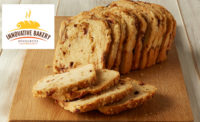Perfect Snacks brings a fresh perspective to the bar market
Perfect Snacks is making a name for itself as pioneers in the fresh, refrigerated bar market.












For Bud Keith, health and wellness was a way of life. He was, after all, a nutritionist—but his passion went well beyond a degree. In the 1960s, he established a juice bar and gym in Mission Beach, an iconic ocean-side neighborhood in San Diego. He worked with legendary “Godfather of Fitness” Jack LaLanne. He developed nutritional supplements to help fill common dietary gaps. He traveled the country lecturing on the merits of a healthy life—and particularly the benefits of fresh, whole-food nutrition.
By the 1980s, Bud had married, and he and his wife Barbara had a brood of children. But the kids didn’t like to take their nutritional supplements. So he mixed his signature whole-food supplement ingredients with some freshly ground organic peanut butter and honey, shaped it into bar form, and the first Perfect Bar was born.
Those bars became the cornerstone in the product lineup at Perfect Snacks, based in San Diego, a company the Keith kids eventually founded. The bars are fresh, and require refrigeration—a unique point of differentiation in the competitive bar market. Consumers increasingly seek fresh, nutritious, whole-food snacks, and Perfect Snacks fills that need.
Today, Perfect Snacks is still run by the Keith family, and it’s still based in San Diego. Through the years, the Keith children pioneered the fresh, refrigerated protein bar market, now with 11 Perfect Bar varieties, two Perfect Kids bars and—most recently—two Perfect Bites SKUs in the lineup, with products distributed to more than 20,000 retailers nationwide and in Western Canada.
Fueled by necessity
Life in the Keith family was far from typical. “As the oldest of 13, my siblings and I spent a good part of our childhood traveling the country in a motorhome, homeschooled by our mom, while our eccentric nutritionist dad gave talks about the benefits of whole-food nutrition in cities nationwide,” says Bill Keith, co-founder and CEO.
“In 2005, our dad was diagnosed with melanoma skin cancer,” says Bill. “With 13 of us kids, all under the age of 22, we needed a way to provide for our family. That’s when our eldest siblings banded together and gambled it all to turn our dad’s recipe into a true sibling startup. It was then that we launched The Original Refrigerated Protein Bar out of our mom’s kitchen.”
Bud had created the first Perfect Bar recipe back in the 1980s, but it was the Keith kids who turned it into a business—to support the family and help pay the mortgage on their house, since Bud could no longer work due to his illness.
“With just a few of us in college, we were able to get part-time jobs, but a part-time paycheck wasn’t going to cut it for what our family needed,” says Bill. So the kids convinced their mom to sell their family-owned bed and breakfast and loan them $100,000—all the money the Keith Family had to their name at the time—to buy a flow-wrapping machine to commercialize the bars.
Perfect Snacks is truly a family business—established by the Keith kids, and with several family members still in leadership positions with the company. “The roles and responsibilities assumed by our siblings were a mix of skill sets and needs within the company,” says Bill. “I assumed the sales role, starting with sleeping in my car for a month outside of Whole Foods Berkeley to demo the product with the hopes of gaining distribution.”
Perfect Snacks is known for its superfood blend that goes into every bar—a mix that includes whole-food ingredients like kale, flax seed, rose hips, orange, lemon, papaya, tomato, apple, alfalfa, celery, kelp, dulse (red seaweed), carrot and spinach—all of which are organic.
Bill notes that the formula for the original Perfect Bar hasn’t changed all that much since the early days of his dad’s recipe. “We’ve been able to improve in some ways throughout the years. For example, we’ve optimized our organic superfood blend. Additionally, the industry has progressed in recognizing clean ingredients with credentials and seals, which we‘ve worked hard to obtain through innovating our manufacturing processes and elevating our quality-assurance measures throughout the supply chain. Certifications like USDA organic, Non-GMO Project Verified, low-GI and fair trade are all seals that just didn’t have the clout or recognition in the early 2000s that they do today.”
Fresh pioneers
The way Bud originally crafted the Perfect Bar recipe made refrigeration a necessity. “With freshly ground nut butter as the base, whole-food protein and superfoods mixed in, and honey as the only natural binder, refrigeration is required to maintain the bar’s consistency, texture and shape,” says Bill. “If we would have had the choice—and knew how difficult it would be to bring the first refrigerated protein bar to market—we probably would have opted to forgo the fridge. Looking back, though, we wouldn’t do it any other way.”
In 2005, when Perfect Bar first launched, fresh, specialty CPG products were still rare. This was before the advent of commercial kombucha or overnight oats. “Because of that, we grew slowly, yet strategically,” says Bill.
“We were bootstrapped for the first 10 years of our business and maintained a very ‘stay scrappy’ mentality throughout,” says Leigh Keith, co-founder and president, and Bill’s sister. “My siblings and I navigated the manufacturing and distribution space while managing growth through continuous trial and error, as we didn’t have the CPG experience of our industry counterparts.”
They had limited resources—but a great deal of ambition. And that ambition was reinforced through the loyalty shown by the brand’s early-adopter fan base. “With the aim to educate consumers that fresh, whole-food nutrition could be delicious and craveable, we gained genuine consumer endorsement over the years as distribution across the nation grew,” says Bill.
But achieving retail buy-in was an uphill battle. “Since we were a one-of-a-kind product for so long, we had to convince category managers of different refrigerated product sets that a fresh protein bar belonged in their set,” says Bill. “Each one would say, ‘No, that doesn’t belong in my set, go talk to this person,’ which prompted placement in a different area in every store.” Then they had to prove that they could hit projected sales targets—but the bars were often merchandised amidst everyday core refrigerated grocery staples like yogurt, milk and eggs that had much-higher numbers.
“Like many young, natural CPG brands, we started in the natural channel,” says Leigh. “Given our unique product, we decided to focus on natural, where our brand would resonate most with consumers, as they’re privy to the benefits of organic, non-GMO and other clean-food credentials.”
One approach was to tirelessly execute tasting demos. “It proved successful for our unique type of product, which requires quite a bit of context, as well as trial to truly taste the difference from other protein bars,” says Bill.
Bud Keith passed away in 2009, but not before he saw his children bring his creation to the nation.
The Keith children continued to refine their approach toward fresh CPG product branding—and they gained traction.
“We gained an invaluable data and analytics team and turned on primary research tools to learn shopper behavior and attitudes,” says Bill. “There are macro trends we’ve found amongst consumers, via Catalina data, that show the high propensity to buy Perfect Bar with other fridge-fresh products in various categories. We not only share our support initiatives with our retail partners, but we listen to their customer insights and needs to feed our efforts. We have a people-first mentality and foster mutually beneficial relationships with each respective partner, which has proven to be a successful approach for our brand.”
A strategic investment
In 2015, the company accepted minority investment from VMG Partners. The goal was to use the firm’s expertise and strategic insights to elevate the small, family business into something that could reach more people.
“It certainly has done just that,” says Leigh.
“After 10 years of running the business with my brothers and sisters, VMG helped us to bring in an executive team made up of industry powerhouses from the nation’s top CPG brands—Kashi, 5-Hour Energy, General Mills and Udi’s,” says Leigh. “With the invaluable resources the investment and talent brought to our brand, we have since grown the brand to heights our family never even dreamed of reaching.”
Today, the Perfect Bar lineup includes 11 flavors: Peanut Butter, Dark Chocolate Chip Peanut Butter (the best-selling SKU), Chocolate Walnut Brownie, Mocha Chip, Dark Chocolate Almond, Blueberry Cashew, Coconut Peanut Butter, Maple Almond, Almond Butter, Fruit & Nut and—the newest flavor—Salted Caramel. The bars range from 10 to 17 grams of protein per bar. Two mini products are also available, Almond Butter Mini and Peanut Butter Mini. The Perfect Kids lineup debuted in October 2018, with two flavors: Chocolate Chip and Peanut Butter Cookie. The bars each contain 7 grams of protein.
The newest addition to the Perfect Snacks lineup is Perfect Bites, launching this month. Sold in lidded cups, Perfect Bites are bite-sized protein snacks with 7 grams of protein per serving (11 pieces).
Over the past three years, Perfect Snacks has grown distribution from 5,000 stores to more than 20,000, now in top U.S. retailers like Target, Trader Joe’s, Starbucks, Walmart, Safeway/Albertsons, Kroger and more, while enhancing brand presence within existing retailers, like Whole Foods, Costco and Sprouts, notes Leigh. “Additionally, our e-commerce business, between direct-to-consumer and Amazon, has become a focal point within the last three years, generating over 100 percent CAGR since 2016.”
A growing family
Perfect Snacks is following a path of continuous improvement. “This year, we have a major focus on sustainability initiatives throughout all aspects of the company,” says Leigh. “We’re leaning into our e-commerce processes to be greener with our drop-ship packaging, with the goal to be curbside-reliable while still containing fresh snacks, shipped cold.” The company is also working toward a goal of having a zero-waste headquarters by 2020.
Perfect Snacks also places a heavy focus on community involvement, providing each employee with 20 hours of paid volunteer time annually, serving with organizations of their own choosing. “We hope to have 100 percent of employees hit their 20-hour threshold by the end of the year,” says Leigh.
Collectively, these initiatives are working. Today, Perfect Snacks products are outpacing shelf-stable protein-bar counterparts, says Leigh. She notes that, according to recent SPINS data, Perfect Bar is now the No. 1 and No. 2 bar item in Vons, and the No. 5 growth brand in all of conventional grocery.
“I couldn’t be more proud of what my family and our team—a true extension of our family—has been able to achieve over that past 14 years,” says Leigh. “Building healthy communities from the inside out starts at home. Having passionate, hard-working people who share your vision and values as the foundation of your brand is, without a doubt, the most-important factor in being truly successful.”
Over the next few years, Leigh notes that Perfect Snacks will continue building out its fresh-snacking product set across the country, with a three-year innovation timeline ahead. “We couldn’t be more excited for what’s to come.”
Looking for a reprint of this article?
From high-res PDFs to custom plaques, order your copy today!













